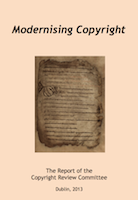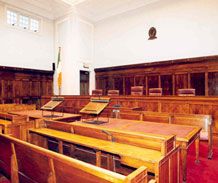 Today in the Department of Jobs, Enterprise and Innovation, Minister Bruton and Minister Sherlock launched Modernising Copyright, the Report of the Copyright Review Committee (pdfs: via this site; via the DJEI site [link updated 18 November 2015]) (see barnold law | Business & Leadership | Damien Mulley| DJEI Press Release here and here | Irish Times | infojustice.org | Irish Independent | Technology.ie | The 1709 Blog | TheJournal.ie).
Today in the Department of Jobs, Enterprise and Innovation, Minister Bruton and Minister Sherlock launched Modernising Copyright, the Report of the Copyright Review Committee (pdfs: via this site; via the DJEI site [link updated 18 November 2015]) (see barnold law | Business & Leadership | Damien Mulley| DJEI Press Release here and here | Irish Times | infojustice.org | Irish Independent | Technology.ie | The 1709 Blog | TheJournal.ie).
Copyright reform is in the air, in Australia, Canada, Germany, India (pdf), the EU (here, here, here (pdf), and here), the UK, and the US (here (pdf) and here). As part of this process, the Copyright Review Committee (the Committee) was established on 9 May 2011 by the Minister for Jobs, Enterprise and Innovation, Mr Richard Bruton (TD). It consisted of Dr Eoin O’Dell (Trinity College Dublin), Patricia McGovern (DFMG Solicitors, Dublin), and Professor Steve Hedley (University College Cork), and it was tasked with proposing solutions for areas of current copyright law that create barriers to innovation.
The Committee established a website for the process, held a public meeting on 4 July 2011, received over 100 written submissions, and published a Consultation Paper on 29 February 2012.…




 The following appears under the above heading in
The following appears under the above heading in 

